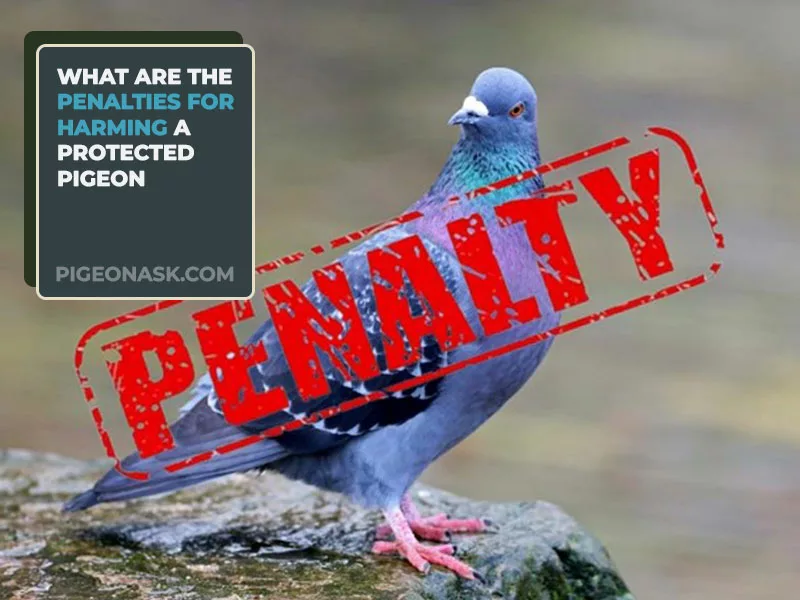Why Are Pigeons Protected?
Pigeons are almost everywhere; they are one of the most common birds found in cities and are considered pests.
Rock doves, which are also known as the common pigeon, populate most urban areas polluting the surroundings with bird droppings. Some even believe they are susceptible to the spread of diseases.
So, why are pigeons protected? The answer to that varies from country to country. Every country has its own law regarding birds. Most breeds of pigeons are protected under the law.
Let us dive deeper into this and learn further about pigeons and their protection.
Looking for more articles about pigeon habits:
Are Pigeons Protected By Law?
Yes, Pigeons are protected by the Law in most countries. In the US, all the breeds of pigeons are protected by law except for the Rock Doves, which are the common pigeons. It is legal to eradicate them through regulated means.

Individual states may have their own laws concerning eradication methods.
In countries such as UK and India, They are protected under the law and can only be eradicated for certain reasons under the law by gaining licenses. Otherwise, it is illegal to kill or destroy the nests of pigeons.
What Is the History of Pigeons Being Protected?
Pigeons have been under the law for over a hundred years now.
It started in 1900 when a US Law (The Lacey Act of 1900) was passed, focusing mainly on protecting wild birds from poaching and expanding to include more animals under its jurisdiction.
Further, in World War I and World War II, there was worldwide legislation to protect homing messenger pigeons from using as wartime communicators.
A US Federal Law prohibited entrapping and killing any form of homing pigeons owned by the US, following the footsteps of Britain, New Zealand, and Portugal aimed at protecting carrier pigeons during the war.
During the war, Homing pigeons were even given special recognition for their work flying to war-prone areas and saving lives.
We have covered an in-depth article on “Pigeon Habits“; if interested, you can check this article here.
Can I Shoot Pigeons on My Arizona Property?
Most birds are under the protection of the Migratory Bird Treaty Act in Arizona, making it illegal to hunt, possess or transport wild birds.
There are only three birds that are excluded from this list, and one of them is Rock Doves which are also known as common Pigeons.

Therefore, Yes! You are allowed to shoot common pigeons in the state of Arizona if you have a hunting license.
The one issue you might face is that if any other breed of pigeons except for common pigeons are shot, you can be legally accountable for it.
Therefore, it is always best to call professionals with legal licenses to remove any pigeon problems you might be facing.
What Are the Penalties for Harming a Protected Pigeon?
Harming a protected pigeon may have consequences that can include fines and even jail time for individuals.

Again, it varies from country to country. Therefore, I will give some insight into the enforcement in different countries.
- According to the US Migratory Bird Treaty Act of 1918, Harming protected Birds and pigeons can lead to severe penalties such as jail time of up to 6 months and up to $15,000 in fines.
- In the U.K. The Wildlife and Countryside Act 1981 can give penalties of up to £5,000 GDP and 6 months custodial sentence for harming protected pigeons.
- In India, the fines range from $50- $200 for harming protected birds and jail time of up to 1 months.
- Japan fines individuals who are found in trafficking wild endangered birds by JPY1 Million which converts to $10,400 and upto 5 years behind bars.
- One extreme penalty lies in New Zealand, which can be up to a maximum of $100,000 and Two years in prison for killing the native pigeon.
What Are Some of the Reasons Why Pigeons Are Protected?
Just because Rock Doves’ are the pigeons we get to see and feel annoyed with doesn’t mean all pigeons get the same treatment!
There are breeds of pigeons that are severely endangered.
So, laws such as the ‘Migratory Bird Treaty Act’ are necessary to make sure that these certain breeds can thrive without any form of poaching.
It is necessary to intervene before any form of extinction takes place.
The Extinction of Passenger Pigeons
A human-led extinction example would be the passenger pigeons. They were utilized for their meat in the US in the late 19th and early 20th Centuries.

These pigeons were estimated to be about 25-40% of the entire bird population of the US, and they went extinct over a few years of unregulated hunting for meat.
If we are not aware of the population of the different pigeons and implement proper laws, otherwise, the outcome of passenger pigeons can happen to any other breed.
Are All Birds Federally Protected?
Under the Migratory Bird Treaty Act of 1918 (MBTA), All migratory birds are federally protected, which includes the bird’s feathers, eggs, and nests.
This does not include ALL the birds. Birds that are considered nonnatives, such as Rock Dove, House Sparrow, and European Starling, do not include in this list.
According to this, except for common pigeons, every other breed of pigeon is federally protected and would have severe penalties if harmed.
Wrapping Up
The laws regulating pigeons are different all around the world, and they are necessary to keep the population of all breeds of pigeons stable and prevent them from extinction.
It is always important to know the regulations before taking any type of hunting and to avoid any form of a law violation.
That will be all regarding how pigeons are protected around the world. Hopefully, it answered the question you had and assisted accordingly.
We highly appreciate you for reading this and sharing this, also, make sure to stay connected with us on our Facebook, Pinterest, and Twitter!
Article References:
- https://blogs.loc.gov/law/2021/09/the-legal-history-of-pigeons/
- https://dnr.maryland.gov/wildlife/Pages/plants_wildlife/MBirdTreatyAct.aspx
Image Credits:
- AlArabiya News
- Change.org
- Canva.com/photos
